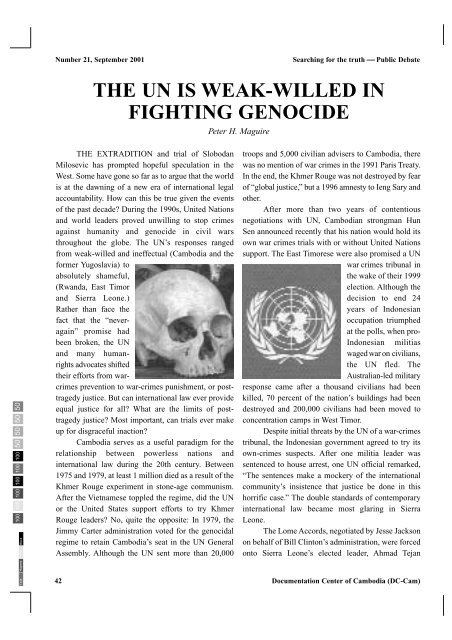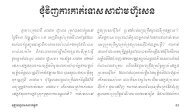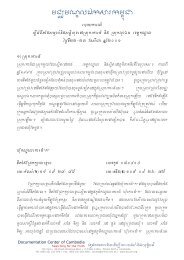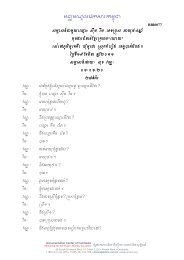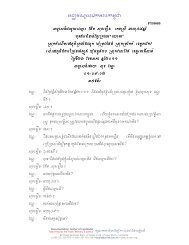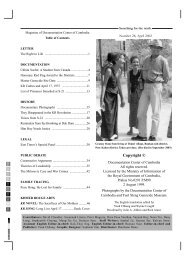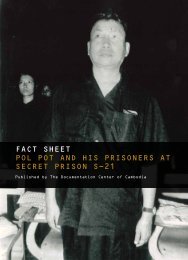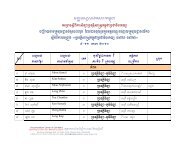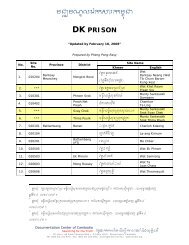Searching for the truth Issues 21 - Documentation Center of Cambodia
Searching for the truth Issues 21 - Documentation Center of Cambodia
Searching for the truth Issues 21 - Documentation Center of Cambodia
You also want an ePaper? Increase the reach of your titles
YUMPU automatically turns print PDFs into web optimized ePapers that Google loves.
100 100 100 100 100 100 50 50 50 50<br />
Black<br />
Yellow<br />
Magenta<br />
Cyan<br />
Number <strong>21</strong>, September 2001<br />
42<br />
<strong>Searching</strong> <strong>for</strong> <strong>the</strong> <strong>truth</strong> ⎯ Public Debate<br />
THE UN IS WEAK-WILLED IN<br />
FIGHTING GENOCIDE<br />
THE EXTRADITION and trial <strong>of</strong> Slobodan<br />
Milosevic has prompted hopeful speculation in <strong>the</strong><br />
West. Some have gone so far as to argue that <strong>the</strong> world<br />
is at <strong>the</strong> dawning <strong>of</strong> a new era <strong>of</strong> international legal<br />
accountability. How can this be true given <strong>the</strong> events<br />
<strong>of</strong> <strong>the</strong> past decade? During <strong>the</strong> 1990s, United Nations<br />
and world leaders proved unwilling to stop crimes<br />
against humanity and genocide in civil wars<br />
throughout <strong>the</strong> globe. The UN’s responses ranged<br />
from weak-willed and ineffectual (<strong>Cambodia</strong> and <strong>the</strong><br />
<strong>for</strong>mer Yugoslavia) to<br />
absolutely shameful,<br />
(Rwanda, East Timor<br />
and Sierra Leone.)<br />
Ra<strong>the</strong>r than face <strong>the</strong><br />
fact that <strong>the</strong> “neveragain”<br />
promise had<br />
been broken, <strong>the</strong> UN<br />
and many humanrights<br />
advocates shifted<br />
<strong>the</strong>ir ef<strong>for</strong>ts from warcrimes<br />
prevention to war-crimes punishment, or posttragedy<br />
justice. But can international law ever provide<br />
equal justice <strong>for</strong> all? What are <strong>the</strong> limits <strong>of</strong> posttragedy<br />
justice? Most important, can trials ever make<br />
up <strong>for</strong> disgraceful inaction?<br />
<strong>Cambodia</strong> serves as a useful paradigm <strong>for</strong> <strong>the</strong><br />
relationship between powerless nations and<br />
international law during <strong>the</strong> 20th century. Between<br />
1975 and 1979, at least 1 million died as a result <strong>of</strong> <strong>the</strong><br />
Khmer Rouge experiment in stone-age communism.<br />
After <strong>the</strong> Vietnamese toppled <strong>the</strong> regime, did <strong>the</strong> UN<br />
or <strong>the</strong> United States support ef<strong>for</strong>ts to try Khmer<br />
Rouge leaders? No, quite <strong>the</strong> opposite: In 1979, <strong>the</strong><br />
Jimmy Carter administration voted <strong>for</strong> <strong>the</strong> genocidal<br />
regime to retain <strong>Cambodia</strong>’s seat in <strong>the</strong> UN General<br />
Assembly. Although <strong>the</strong> UN sent more than 20,000<br />
Peter H. Maguire<br />
troops and 5,000 civilian advisers to <strong>Cambodia</strong>, <strong>the</strong>re<br />
was no mention <strong>of</strong> war crimes in <strong>the</strong> 1991 Paris Treaty.<br />
In <strong>the</strong> end, <strong>the</strong> Khmer Rouge was not destroyed by fear<br />
<strong>of</strong> “global justice,” but a 1996 amnesty to Ieng Sary and<br />
o<strong>the</strong>r.<br />
After more than two years <strong>of</strong> contentious<br />
negotiations with UN, <strong>Cambodia</strong>n strongman Hun<br />
Sen announced recently that his nation would hold its<br />
own war crimes trials with or without United Nations<br />
support. The East Timorese were also promised a UN<br />
war crimes tribunal in<br />
<strong>the</strong> wake <strong>of</strong> <strong>the</strong>ir 1999<br />
election. Although <strong>the</strong><br />
decision to end 24<br />
years <strong>of</strong> Indonesian<br />
occupation triumphed<br />
at <strong>the</strong> polls, when pro-<br />
Indonesian militias<br />
waged war on civilians,<br />
<strong>the</strong> UN fled. The<br />
Australian-led military<br />
response came after a thousand civilians had been<br />
killed, 70 percent <strong>of</strong> <strong>the</strong> nation’s buildings had been<br />
destroyed and 200,000 civilians had been moved to<br />
concentration camps in West Timor.<br />
Despite initial threats by <strong>the</strong> UN <strong>of</strong> a war-crimes<br />
tribunal, <strong>the</strong> Indonesian government agreed to try its<br />
own-crimes suspects. After one militia leader was<br />
sentenced to house arrest, one UN <strong>of</strong>ficial remarked,<br />
“The sentences make a mockery <strong>of</strong> <strong>the</strong> international<br />
community’s insistence that justice be done in this<br />
horrific case.” The double standards <strong>of</strong> contemporary<br />
international law became most glaring in Sierra<br />
Leone.<br />
The Lome Accords, negotiated by Jesse Jackson<br />
on behalf <strong>of</strong> Bill Clinton’s administration, were <strong>for</strong>ced<br />
onto Sierra Leone’s elected leader, Ahmad Tejan<br />
<strong>Documentation</strong> <strong>Center</strong> <strong>of</strong> <strong>Cambodia</strong> (DC-Cam)


